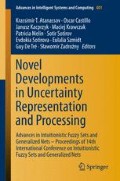Abstract
This article is a part of the series dedicated to AI Methods Inspired by Nature and their implementation in the mechatronic systems. The CutMAG algorithm uses hybrid approach to optimisation, i.e. a combination of classic genetic algorithms (GA) with morphologic optimisation (M) thus creating innovative approach to optimisation of cutting disk design (Cut) for the multi-edge grinder. The input data include population of individuals. Each individual is represented by a set of cutting disks. Whereas the fitness function was assumed as a combination of several postulates of the mechanical design foundations. The method includes mechanical, design and energy aspects. Each individual constitutes a complete solution of the disk set whereas the population represents the entire class of solutions. The fitness function of an individual is calculated as the average fitness of each disk supplemented by information describing the relationship between both adjacent disks. The method for calculation of function values was selected so as to ensure its maximisation in the process of evolution. Although promising results of the genetic algorithms operation were achieved, one can consider further improvement of the method efficiency. The authors used morphological operations in order to better adopt the method to the task.
Access this chapter
Tax calculation will be finalised at checkout
Purchases are for personal use only
References
Angryk, R., Czerniak, J.: Heuristic algorithm for interpretation of multi-valued attributes in similarity-based fuzzy relational databases. Int. J. Approximate Reasoning 51(8), 895–911 (2010)
Apiecionek, L., Czerniak, J., Dobrosielski, W.: Quality of Services Method as a DDoS Protection Tool. Advances in Intelligent Systems and Computing. Springer, Berlin (2015)
Apiecionek, L., Czerniak, J., Zarzycki, H.: Protection tool for distributed denial of services attack. Commun. Comput. Inf. Sci. Springer 424, 405–414 (2014)
Chan, F.T.S., Au, K.C., Chan, L.Y., Lau, T.L.: Using genetic algorithms to solve quality-related bin packing problem. Robot. Comput. Integr. Manuf. 23, 71–81 (2007)
Ciesielska, D.: Ocena wpywu techniki rozdrabniania odpadw z tworzyw termoplastycznych na struktur i waciwoci otrzymywanych recyklatw. Archiwum Technologii Maszyn i Automatyzacji. 25(1), 169–178 (2005)
Czerniak, J.: Evolutionary approach to data discretization for rough sets theory. Fundamenta Informaticae 92(1–2), 43–61 (2009)
Czerniak, J., Dobrosielski, W., Zarzycki, H., Apiecionek, L.: A Proposal of the New Owlant Method for Determining the Distance Between Terms in On-tology. Advances in Intelligent Systems and Computing. Springer, Berlin (2015)
Czerniak, J.M. Apiecionek, Ł., Zarzycki, H.: Application of ordered fuzzy numbers in a new ofnant algorithm based on ant colony optimization. Commun. Comput. Inf. Sci. Springer 424, 259–270 (2014)
De Jong, K., Spears, W.: Using genetic algorithms to solve np complete problems. In: Schaffer, J.D. (ed.) Proceeding of the 3th International Conference on Genetic Algorithms, pp. 124–132 (1989)
Ewald, D., Czerniak, J., Zarzycki, H.: Approach to Solve a Criteria Problem of the ABC algorithm used to the WBDP Multicriteria Optimization. Advances in Intelligent Systems and Computing. Springer, Berlin (2015)
Farzanegan, A., Vahidipour, S.: Optimization of comminution circuit simulations based on genetic algorithms search method. Miner. Eng. 22, 719–726 (2009)
Flizikowski, J., Bieniaszewski, W., Macko, M.: Integron and innovation algorithm of the cereal grain grinder construction. In: Proceedings of the TMCE 2006 Ljubljana, Slovenia (2006)
Flizikowski, J., Kamyk, W.: Algorytmy genetyczne w konstrukcji rozdrabniaczy wielotarczowych ziarna kukurydzy. Inynieria Maszyn 22 (2005)
Flizikowski, J., Macko, M.: Method for estimating the efficiency of quasi cutting of recycled optical telecommunications pipes. Polimery 46(1), 53 (2001)
Jekiel, J., Tam, E.K.L.: Plastics waste processing: comminution size distribution and prediction. Envir. Eng. 133(2), 245–254 (2007)
Macko, M.: Aspekty poboru mocy w rozdrabniaczach wielokrawdziowych. Inynieria i Aparatura Chemiczna (4), 103–104 (2006)
Macko, M., Flizikowski, J., Zych, G.: Konstruowanie rozdrabniaczy w recyklingu z zastosowaniem systemw ekspertowych—re-cykling materiaw polimerowych. Nauka—Przemys (2003)
Marbac-Lourdelle, M.: Model-based clustering for categrocial and mixed data sets. Statitics, Universite de Lille 1 (2014)
Powell, M., Morrison, R.: The future of comminution modelling. Int. J. Miner. Process. 84, 228–239 (2007)
Quagliarella, D.: Genetic Algorithms and Evolution Strategy in Engineering and Computer Science: Recent Advances and Industrial Applications. Wiley, New York (1998)
Rutkowska, D., Piliński, M., Rutkowski, L.: Sieci neuronowe, algorytmy genetyczne i systemy rozmyte. PWN, Warszawa (1999)
Sadrai, S., Meech, J., Ghomshei, M., Sassani, F., Tromans, D.: Influence of impact velocity on fragmentation and the energy efficiency of comminution. Int. J. Impact Eng. 33, 723–734 (2006)
Sameon, D., Shamsuddin, S.M. and Sallehuddin, R., Zainal, A.: Compact classification of optimized boolean, reasoning with particle swarm optimization. Intelligent Data Analysis 16 IOS Press, pp. 915–931 (2012)
Shuiping, L., Hongzan, B., Zhichu, H., Jianzhong, W.: Nonlinear comminution process modeling based on ga-fnn in the computational comminution system. J. Mater. Process. Technol. 120, 84–89 (2002)
Sikora, R.: Przetwrstwo tworzyw polimerowych—podstawy logiczne, formalne i terminologiczne. Wyd. Polit. Lubelskiej (2006)
Woldt, D., Schubert, G., Jäckel, H.G.: Size reduction by means of low-speed rotary shears. Int. J. Miner. Process. 74S, 405–415 (2004)
Author information
Authors and Affiliations
Corresponding author
Editor information
Editors and Affiliations
Rights and permissions
Copyright information
© 2016 Springer International Publishing Switzerland
About this paper
Cite this paper
Czerniak, J.M., Macko, M., Ewald, D. (2016). The CutMAG as a New Hybrid Method for Multi-edge Grinder Design Optimisation. In: Atanassov, K., et al. Novel Developments in Uncertainty Representation and Processing. Advances in Intelligent Systems and Computing, vol 401. Springer, Cham. https://doi.org/10.1007/978-3-319-26211-6_28
Download citation
DOI: https://doi.org/10.1007/978-3-319-26211-6_28
Published:
Publisher Name: Springer, Cham
Print ISBN: 978-3-319-26210-9
Online ISBN: 978-3-319-26211-6
eBook Packages: Computer ScienceComputer Science (R0)

